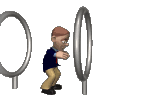How do you define "talent" in numismatics?
I just received two $2.5 gold Indians back from PCGS, one holdered and one bb'd as being cleaned. There simply is no discernible difference in the two, no matter how long and hard I look. The luster, reflectivity and brightness are identical at every point.
Despite the knowledge I've tried hard to gather, I feel like Charlie Brown trying to play baseball--inept, with no talent at all. I read from time to time about "talented" numismatists, including, recently a 13-year-old whiz-kid who possesses a knack for spotting errors. How does talent manifest itself in this endeavor anyway? How would you define it, and what would you put up as an example?
Despite the knowledge I've tried hard to gather, I feel like Charlie Brown trying to play baseball--inept, with no talent at all. I read from time to time about "talented" numismatists, including, recently a 13-year-old whiz-kid who possesses a knack for spotting errors. How does talent manifest itself in this endeavor anyway? How would you define it, and what would you put up as an example?

0
Comments
<< <i>I just received two $2.5 gold Indians back from PCGS, one holdered and one bb'd as being cleaned. There simply is no discernible difference in the two, no matter how long and hard I look. The luster, reflectivity and brightness are identical at every point. Despite the knowledge I've tried hard to gather, I feel like Charlie Brown trying to play baseball--inept, with no talent at all. I read from time to time about "talented" numismatists, including, recently a 13-year-old whiz-kid who possesses a knack for spotting errors. How does talent manifest itself in this endeavor anyway? How would you define it, and what would you put up as an example? >>
Its all in having a good eye and lots of experience. Been collecting for almost 20, and despite what I know, I am always learning new stuff.
The "good eye" is what I'm talking about. It's obviously a trained eye, but are some people inherently gifted at various aspects of grading, spotting errors, etc.?
<< <i>Its all in having a good eye and lots of experience. Been collecting for almost 20, and despite what I know, I am always learning new stuff. The "good eye" is what I'm talking about. It's obviously a trained eye, but are some people inherently gifted at various aspects of grading, spotting errors, etc.? >>
Well, my numismatic skills keeps getting better and better. Just aquired a trinocular microscope not too long ago, and boy am seeing some really neat stuff!
ok, seriously, what you want to do is get a pinpoint light source, a Tensor lamp is ideal but any bright light will do as long as it is a single small bright bulb rather than a big bulb like a florescent.
hold the coin 6-12 inches from your naked eye, angled to reflect the light from the lamp into your eyes, and rotate the coin back and forth, left and right, around in circles. Look very closely for fine, parallel lines, probably in a small patch somwhere, maybe very lightly in all the fields, maybe just on one side.
if you see something suspect, inspect more closely and use a 5 or 7 power magnifying glass (10X will work but is a little overkill) You are likely as not to find the "cleaned" area(s)
if not, they probably just want another grading fee
Liberty: Parent of Science & Industry
Yet another case for the perfectly acceptable practice of, in my opinion, "net" grading a coin that has been deemed to have been cleaned. What's the big deal for PCGS not to holder and net grade what they think is a cleaned coin?
If you resubmit your bb'd coin to PCGS and it gets holdered this time what is that saying about "talent" in numismatics?
Great spirits have always encountered violent opposition from mediocre minds.-Albert Einstein